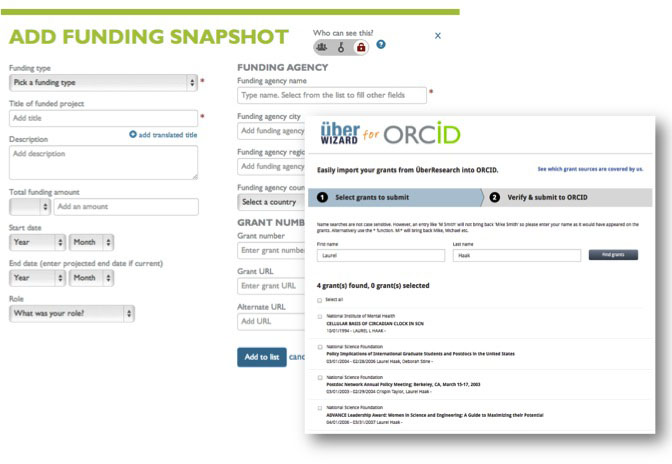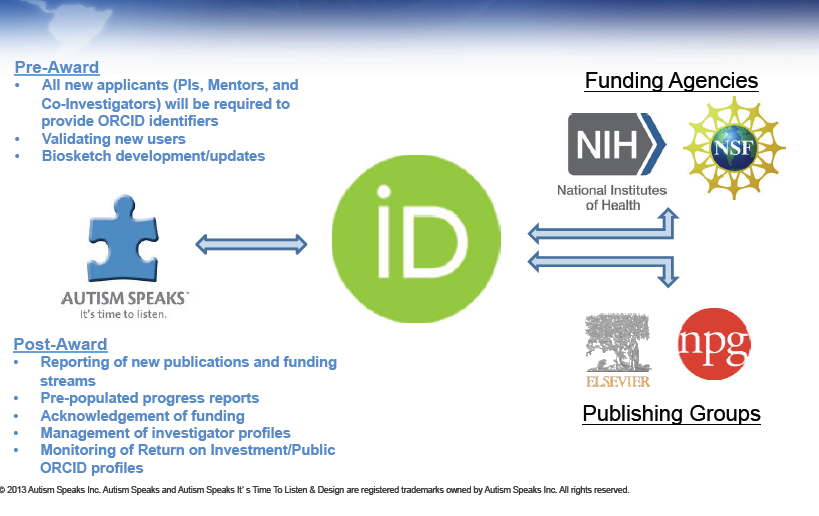It goes without saying that funding is essential for research. Perhaps less well-recognized is that funding awards are an important component of a researcher’s record of contributions. ORCID now provides researchers the tools to link their ORCID iD to their funding awards. Together with efforts by funding organizations to integrate ORCID identifiers into grants application and post-award reporting workflows, these tools will support the claiming of existing and new funded awards.
To facilitate linkages to existing funding, we have created a form with fields that are consistent with the CASRAI dictionary, and added ÜberWizard, the first search tool in the ORCID Registry specific for grants, developed by ÜberResearch. To ensure that funding information is unambiguously linked to funding agencies, we leverage CrossRef’s FundRef Registry of funding organizations.
Link to existing funding metadata
Researchers may link their ORCID record to funding awards using our new funding module. Just log into your account, and scroll to the new Funding section in your record. Once there, you may
- click the Add Funding Manually button to type in funding metadata into a form, or
- click the Import Funding button to use the ÜberWizard to search over a million awards made by funders around the world and import your awards.
ÜberResearch is offering to help other research funders to include their data in the wizard. “We believe this will be easier for funders, easier for users, and beneficial for both. The researcher can add all of their grants in one step, saving time and making adoption more likely,” says Christian Herzog, CEO of ÜberResearch.

Funding organization identifiers
ORCID is collaborating with CrossRef (the organization that is the digital hub for metadata for millions of scholarly documents) to use the FundRef Registry to support our funding interface. CrossRef’s FundRef Registry is a controlled taxonomy of more than 5500 global government and private funding organizations that provides a standard way to report funding sources for published scholarly research to funders, institutions, researchers, and the public.
CrossRef’s Member Publishers use the Funder Registry to collect funding information during the manuscript submission and production process. Ed Pentz, CrossRef’s Executive Director elaborated. “Publishers can also use our tools to retroactively extract funding information from already-published content,” he noted. “Our members submit funding data with the bibliographic information they provide to CrossRef when they register content. This means that funding data is available to the members, libraries, and third parties who access the CrossRef’s metadata from 65 million bibliographic records. The ability to link grants, researchers, and scholarly literature made possible by our collaboration with ORCID and their other relationships is very powerful.”
ORCID also uses organization identifiers to support linkages to education and employment affiliations, leveraging Ringgold organization identifiers. To ensure interoperability between the identifiers, we have been working with FundRef, Ringgold, and Elsevier (which donated the funder list that serves as the core of the open FundRef list) to harmonize these organization lists and to develop a practical plan to maintain the lists over time. With ISNI organization identifiers acting as a bridge between these and other lists, the community may yet be able to parse organization names within and between data systems.
Funding organizations and ORCID identifiers
In addition to being able to link your ORCID identifier with your existing grants and funding activities, we are working with research funders to ensure that ORCID identifiers are integrated in funding workflows and embedded in funding applications at the time of submission. Funding organizations are increasingly calling for the use of ORCID and other persistent identifiers and research exchange standards in grants submissions and management processes. One example is the Horizon 2020 call for proposals, in which the European Commission requested that grantees use persistent identifiers for data and contributors. In a presentation on their new grants manual, the EC states, “Where possible, it is also recommended that contributors be uniquely identifiable, and data uniquely attributable, through identifiers which are persistent, non-proprietary, open and interoperable (e.g. through leveraging existing sustainable initiatives such as ORCID for contributor identifiers and DataCite for data identifiers).”
Some federal and foundation funders have taken the additional step of becoming ORCID members and integrating ORCID identifiers into grant submission systems, among them Autism Speaks, the US Department of Energy, the US Food and Drug Administration, Fundação para a Ciência e a Tecnologia (FCT), Japan Science and Technology Agency, Qatar National Research Foundation, the US National Institutes of Health, the UK National Institute of Health Research, and Wellcome Trust.
The Wellcome Trust has been a supporter of ORCID since our inception, recognizing the potential for ORCID to reduce the administrative burden and inefficiencies in grant application and research activity reporting systems. As a first step, Wellcome Trust has integrated ORCID identifiers into its eGrants online grant application system.

Autism Speaks, another foundation funder, also started by integrating ORCID identifiers into its grant application system. However, as Ed Clayton, Senior Director of Strategic Funding and Grants Administration, explained at a January meeting in New York City, as they discussed plans, they found more opportunities for both the foundation and their grantees if they implemented ORCID more broadly in their systems, from pre-award to post-award and in linkages and information exchange with other funders and publishers.
Among federal funders in the United States, the Department of Energy Office of Science and Technology (OSTI) was the first to integrate ORCID identifiers. OSTI has integrated ORCID iDs into its announcement notices and grants processing systems. Also a research producing organization, OSTI also encouraged its staff and contractors to include ORCID identifiers in written work products, and is including identifiers in the author information and search and retrieval process for DOE databases such as SciTech Connect and in products managed by OSTI such as Science.gov, World Wide Science.org, and the ETDEWEB.
We reported earlier that the US National Institutes of Health has integrated ORCID identifiers into its ScienCV platform, an online professional profile that can be made public to share with others. In SciENcv users can document their education, employment, research activities, publications, honors, research grants, and other professional contributions. Another biomedical funder, the Australian National Health and Medical Research Council has taken the initial steps to request ORCID identifiers in their online grants application system.
Interactions between funders and national CRIS systems
 The integration of ORCID identifiers in funding workflows can potentially support the import of publication, funding, and affiliation information needed to support a grant application as well as post-award reporting. In late 2013, the Fundação para a Ciência e a Tecnologia (FCT), the national funder in Portugal, adopted ORCID. It all started with the process for international evaluation of Portuguese R&D units (similar to REF in the UK), a component of which was a bibliometric analysis. This process involved a nationwide call for all FCT-funded investigators to register with ORCID and use the Scopus-to-ORCID import wizard to populate their ORCID record with publications. In three weeks, the call led to 40,000 registrations among Portuguese researchers, 15,000 of whom were FCT investigators. Over 75,000 publications were linked to these records. In parallel, pilots using ORCID data were conducted in two nation-wide systems. In a pilot with the DeGóis CV system, 2000 researchers associated their ORCID to their CV and imported over 8500 publications. A second pilot with the Authenticus indexed publications repository resulted in the researcher-driven import of more than 130,000 publications, which were automatically associated with the authors. The FCT presented these results at a workshop in February, where ORCID was discussed as a component of a nation-wide CRIS eco-system that enabled researcher identification and interoperability among multiple research systems in Portugal, including the RCAAP national Open Access repository. “A publication should be recorded only once and reused multiple times across systems,” said João Mendes Moreira, FCT, unit FCCN.
The integration of ORCID identifiers in funding workflows can potentially support the import of publication, funding, and affiliation information needed to support a grant application as well as post-award reporting. In late 2013, the Fundação para a Ciência e a Tecnologia (FCT), the national funder in Portugal, adopted ORCID. It all started with the process for international evaluation of Portuguese R&D units (similar to REF in the UK), a component of which was a bibliometric analysis. This process involved a nationwide call for all FCT-funded investigators to register with ORCID and use the Scopus-to-ORCID import wizard to populate their ORCID record with publications. In three weeks, the call led to 40,000 registrations among Portuguese researchers, 15,000 of whom were FCT investigators. Over 75,000 publications were linked to these records. In parallel, pilots using ORCID data were conducted in two nation-wide systems. In a pilot with the DeGóis CV system, 2000 researchers associated their ORCID to their CV and imported over 8500 publications. A second pilot with the Authenticus indexed publications repository resulted in the researcher-driven import of more than 130,000 publications, which were automatically associated with the authors. The FCT presented these results at a workshop in February, where ORCID was discussed as a component of a nation-wide CRIS eco-system that enabled researcher identification and interoperability among multiple research systems in Portugal, including the RCAAP national Open Access repository. “A publication should be recorded only once and reused multiple times across systems,” said João Mendes Moreira, FCT, unit FCCN.
Enter Once Use Multiple Times
In collaborating with the community to enable linkages with existing funding and to embed ORCID identifiers in new funding awards, our goal at ORCID is to enable researchers to more easily access information and to reduce their reporting burden, while at the same time improving the ability of funding organizations to understand the impact of and optimize their programs.
As Benjamin Thomson explained in a Wellcome Trust blog almost a year ago, “ORCID isn’t just to help researchers fill in their forms more efficiently; it’s also designed to help funders track researcher’s progress and whether our grants are producing high quality science. ORCID will help us link the researchers we support to the things they’ve produced and remove name ambiguity, which can make the selection of peer reviewers and experts difficult.”
It is truly exciting to see this vision starting to be realized.
